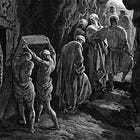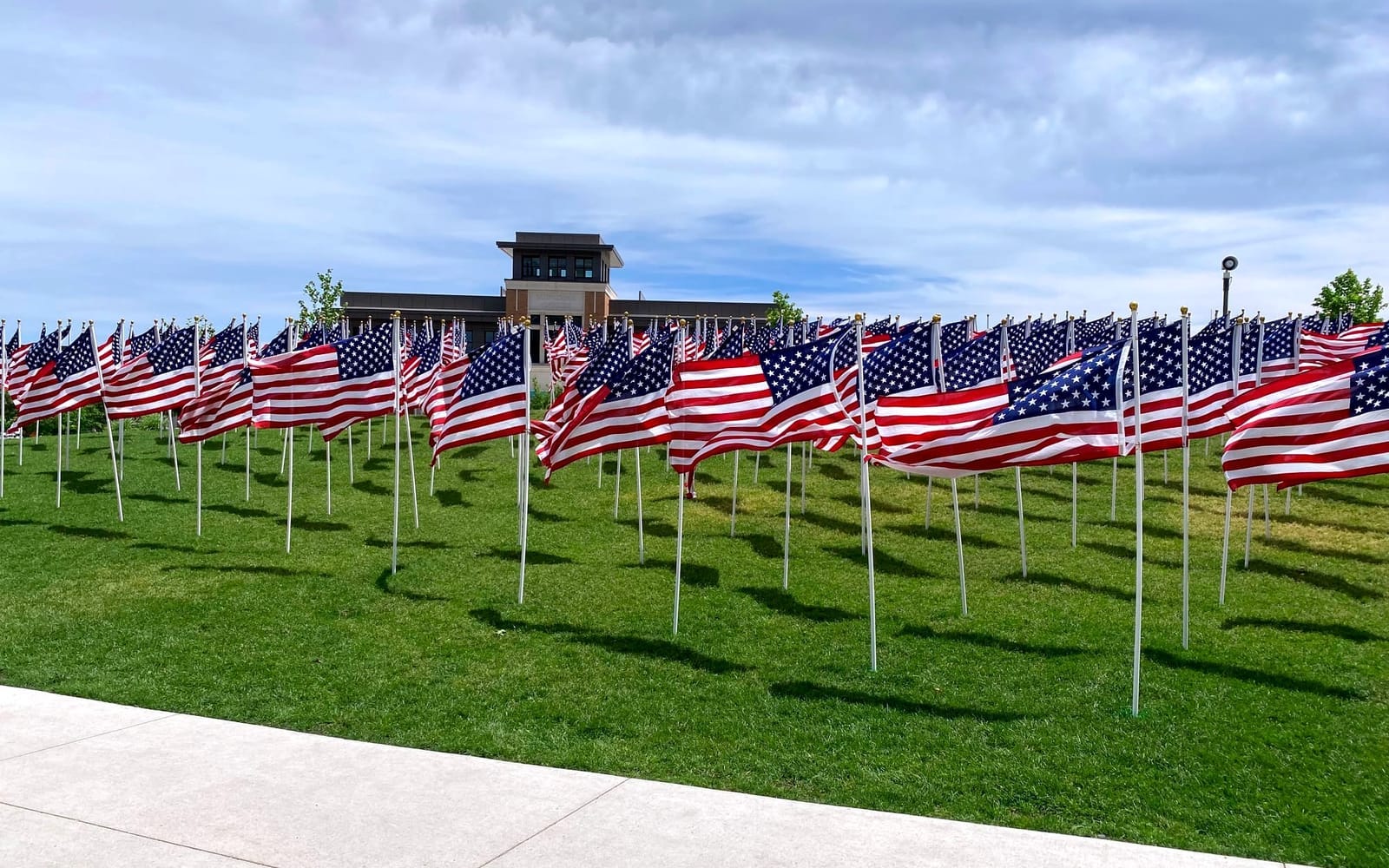№ 4: No tongue can bid me thence depart
Newsletter: Desolation | America: a review | Previously, on Psalter the Earth
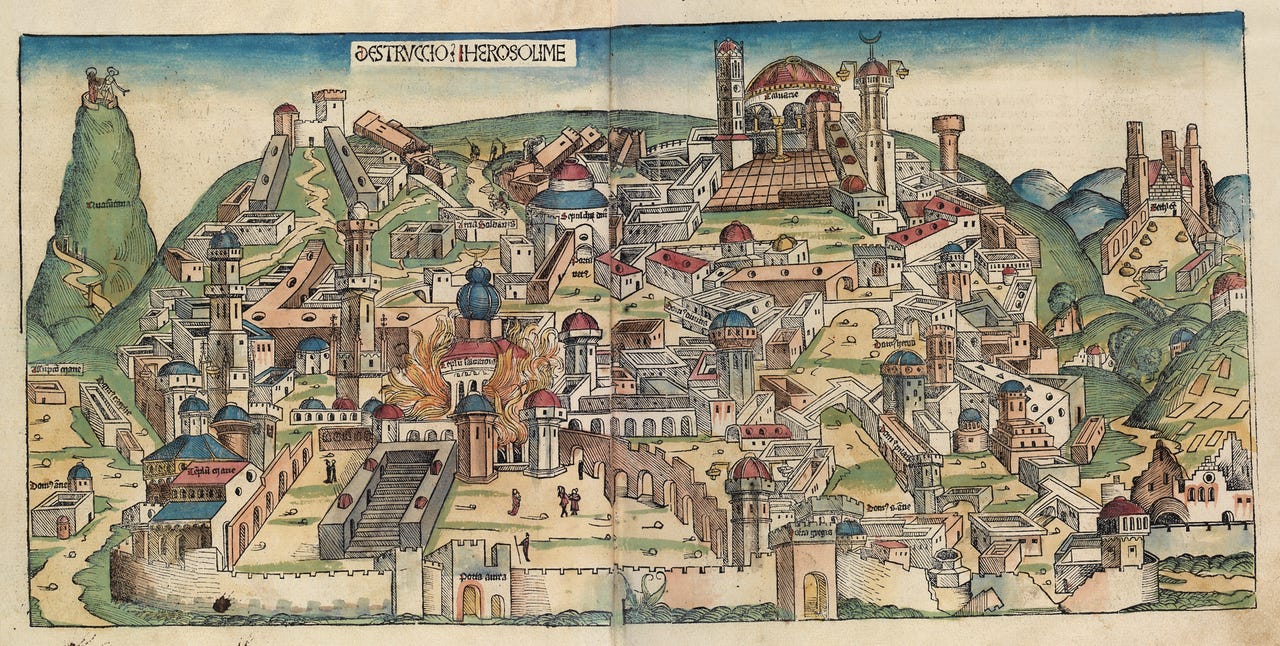
Desolation
It has become somewhat fashionable to understand the present situation of Christians in the West as an exile, following the pattern of the Babylonian exile or the experience of the recipients of Peter's first epistle. According to this view, our exile consists in our being a once-powerful majority in the culture which is now removed from the centres of power and pushed out to catacombs. However, the proponents of exile tend to go further: this exilic state of affairs is not merely a recent historical contingency for a part of the Church, but is actually one of the most basic features of the whole Church's existence in all the world for all of history. Thus, we ought not to expect or seek a way out of such an exile prior to Christ's second advent. Christ must reign until all our enemies have put us under their feet, or something like that.
Subject to some qualifications that I'll sketch below, I think this exile concept has taken on a life of its own in the discourse, and largely become detached from the exile motif as it is actually presented in Scripture. Rather than leading us to call upon God to restore our fortunes, it has the effect of causing us to embrace and tolerate our desolation.
The heart of the exile motif is not that God's people are in an uncomfortable or undesirable situation, but that they are excluded from access to the local presence of God in the temple—or, by extension, the sanctified land surrounding the temple. So Adam and Eve's expulsion from the garden, that prototypical temple, was an exile. Then, their son Cain's being driven "from the presence of the Lord" (Gen. 4:16) was a further exile from the "holy land" of Eden. And though David was not driven out of the land of Israel by Saul for his sins, it nonetheless had the effect that David was prevented "from abiding in the inheritance of the Lord" (1 Sam. 26:19). The definitive exile of the kingdom of Judah under Nebuchadnezzar involved not only God's expulsion of the people from the land, but his own glory departing from the temple.
To be in exile is not necessarily the same thing as being a sojourner: Abraham was a sojourner in a land not his, which was an uncomfortable and undesirable experience in many ways, but he was by no means expelled from the presence of God. Neither was Abraham's sojourn in Canaan a matter of waiting to be whisked away to somewhere else, but rather an anticipation and preparation for his seed taking possession of what was promised.
One strange feature of popular exile theology is that the New Covenant is re-imagined as the commencement of a new condition of exile for the people of God, lasting several generations until the end of history. This is, in my view, almost perfectly the opposite of what the psalms and the prophets teach in many places. Exile was the status quo ante during the time of the Old Covenant; the coming of Christ and the outpouring of the Holy Spirit would effect the end of exile for the faithful people of God (e.g., Ezekiel 36:24ff). So in the fullness of time, Zachariah prophesied that God would now begin to fulfil these promises to his people and undo their desolation:
As he spake by the mouth of his holy prophets, which have been since the world began: That we should be saved from our enemies, and from the hand of all that hate us… [Luke 1:70-71]
The way to tell whether or not you are in exile is to ask whether or not you have access to God's presence in the sanctuary. God's fulfillment of his covenant with Abraham means that the city of God is fundamentally exile-proof: this is because Christ our head cannot be exiled from heaven. So we sing, I know that while in heaven he stands, no tongue can bid me thence depart.
Having said all this, I would agree that we can meaningfully speak of the Church, from time to time and from place to place, as being desolate: while she is not excluded from the heavenly sanctuary, she may from time to time squander that privilege and become increasingly unfaithful. Jesus taught that the salt of the earth may become so flavourless that its only remaining virtue is that its enemies can have something to trample upon. Similarly, the force of Christ's letters to the seven churches in Revelation is that a particular church, if she does not persevere faithfully, can displease him and so come under his discipline for a time until she repents—or not.
We could list many historical examples of the Church in desolation, and in those cases, it is more than fitting to learn from the examples of the various exiles in the Scriptures. Surely, the Western Church is now in such a desolate condition: we do not make the world around us taste particularly salty and our enemies have come to trample on us. But if we want to learn from the biblical pattern of exile, we will find that God wants us to recognise that we are under his covenantal discipline, and that we should confess our sins and seek to be restored to glory:
O Lord, according to all thy righteousness, I beseech thee, let thine anger and thy fury be turned away from thy city Jerusalem, thy holy mountain: because for our sins, and for the iniquities of our fathers, Jerusalem and thy people are become a reproach to all that are about us. Now therefore, O our God, hear the prayer of thy servant, and his supplications, and cause thy face to shine upon thy sanctuary that is desolate, for the Lord's sake. [Dan. 9:16-17]
It should strike us as very strange that the exile motif is so readily invoked by those who seem to have little interest in calling upon God to shine his face once again upon his desolate Church.
America: a review
As mentioned in a previous newsletter, Jemimah and I had a family wedding to attend in Detroit at the end of May. Jemimah had lived for a few months in New Haven, Connecticut about five years ago, this was my first adventure to the land of the free. Never one to shrink back from ambitious projects, I have decided to review America.
We had planned a flight from Sydney to Dallas, then a connecting flight to Detroit the same afternoon, with a gap of about three or four hours. Alas! our connecting flight was delayed, delayed, delayed in half-hour increments for about six hours until, just after midnight, it was finally cancelled. Thus began hours of lining up to book a new flight, and then arranging our own accommodation in the small hours of the night. Not cool, American Airlines!
However, we really enjoyed our unexpected day in Dallas. I especially enjoyed some honest-to-goodness Texas barbecue at Pecan Lodge.

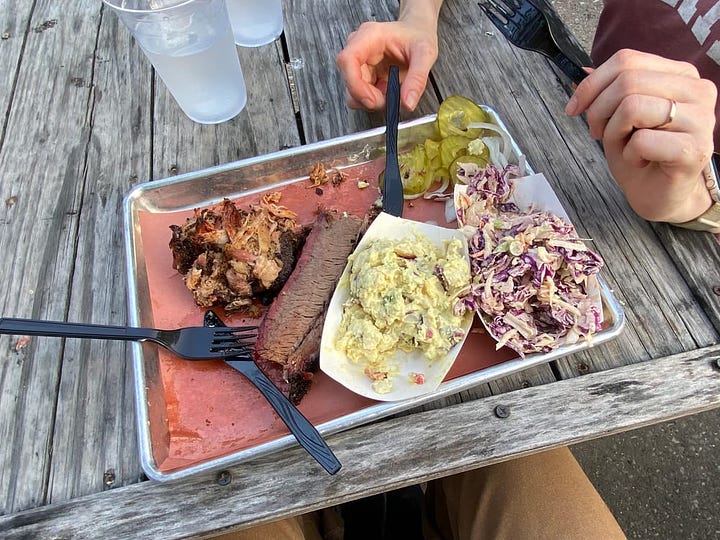


After the surprise day in Dallas, we flew out of Dallas to Detroit, and drove over to a small town called Saugatuck by Lake Michigan, where we stayed for a few nights. It was a very pleasant and peaceful small town, albeit with the occasional whiff of weed in the air. (Someone in our party described it as the Lennox Head of Michigan, which seemed about right.)
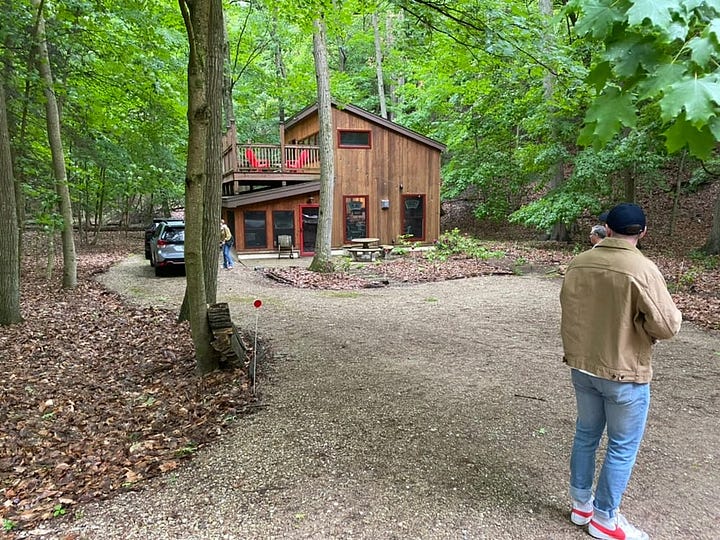
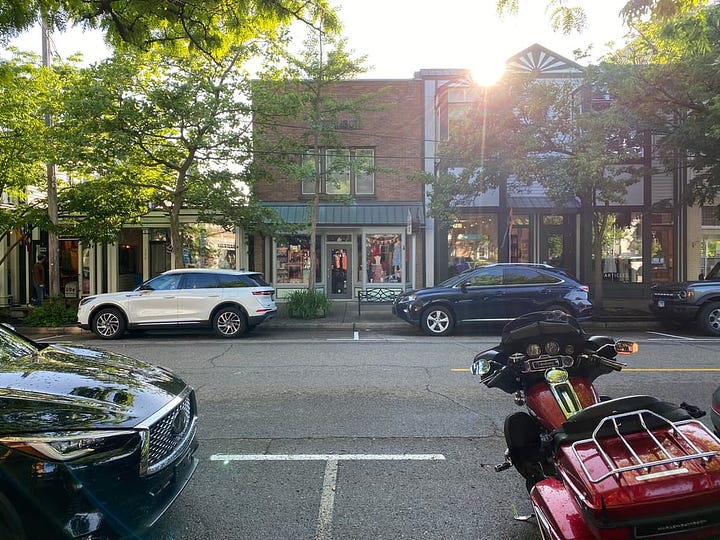


After a few nights in Saugatuck, we drove back to Detroit, thus beginning a string of parties and shindigs each night until the wedding day.
If the billboards along the motorway are any indication, the economy of Detroit is largely concerned with personal injury litigation and cannabis.
Speaking of motorways, the locals seem to drive very fast and very agressively. It was described to us by one Detroiter as "confident"; in my reckoning, it would appear that the locals simply don't wish to live...


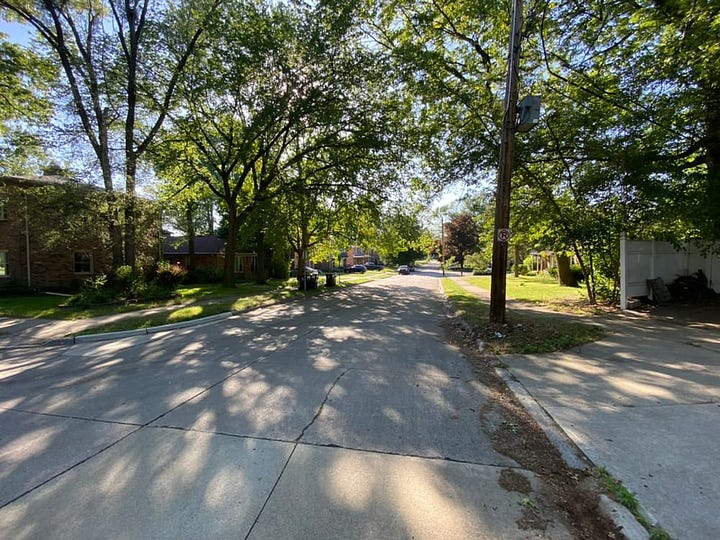
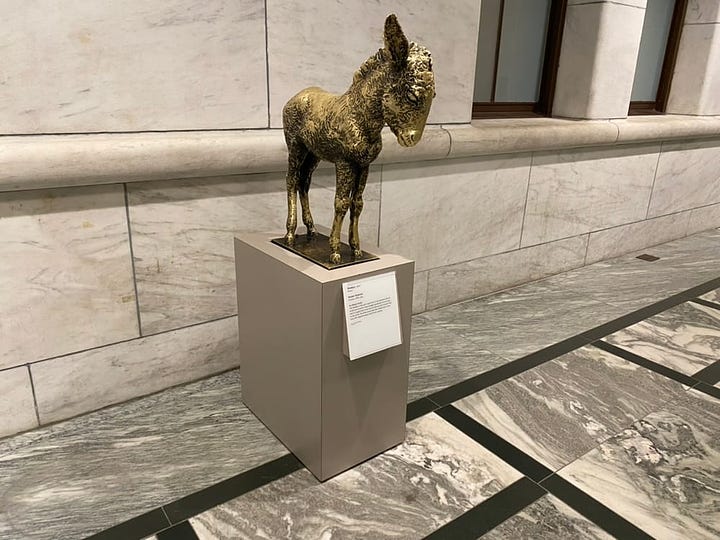
The happy couple was Jemimah's cousin Joshua, who is a PhD candidate at the University of Michigan, and Mallory, who is a social worker and lover of all things Edwin Friedman.
The wedding was a high church Catholic wedding at the Cathedral of the Blessed Sacrament. (I found myself flicking through their hymnal, and was amazed at the number of times I came across some hymn or other written by Isaac Watts.)
Special mention must be made of the Jerry Ross Band, who served up classic bluesy hit after classic bluesy hit for hours. Five stars, would love to groove along with them again.
Some miscellanies:
I enjoyed Chick-fil-A, yes, but let's not get carried away.
I was astounded that Australians could just rent a car and be trusted to figure out driving on the right-hand side of the road.
I still have no idea how much I was supposed to tip the waitstaff.
Australian travellers: you should avoid espresso-based beverages in most cases, but you will probably enjoy a typical Americano coffee; however, beware the gargantuan serving sizes.
Overall, I rather liked America and I would heartily recommend it (assuming of course that the rest of it is similar to Detroit and Dallas).
Previously, on Psalter the Earth
God owes us nothing
Following William Perkins, I here reflect on the fact that all things we receive from God—even our rewards—are fundamentally gifts given, not wages earned.
God owes us nothing
Low church subtraction story
I attempt to put words to something I've observed for quite some time, a phenomenon I have provisionally called the low church subtraction story. Is the de-liturgised worship that is prized in some circles merely the removal of needless extras, or does it represent a substantively different positive vision of what corporate worship is for? I sketch an argument for the latter.
Low church subtraction story
Any excuse
I note a fun excerpt from a book I was reading on Chrysostom's parishioners and their flaky church attendance.
Chrysostom: Any excuse for absence is now deemed acceptable
Out of the depths
Supporters can enjoy my reflections upon (most of) Psalm 130, thinking about its use of biblical symbols and how they bear upon the Christian life. (A second part will follow soon.)
Out of the depths
God bless,
Sean




